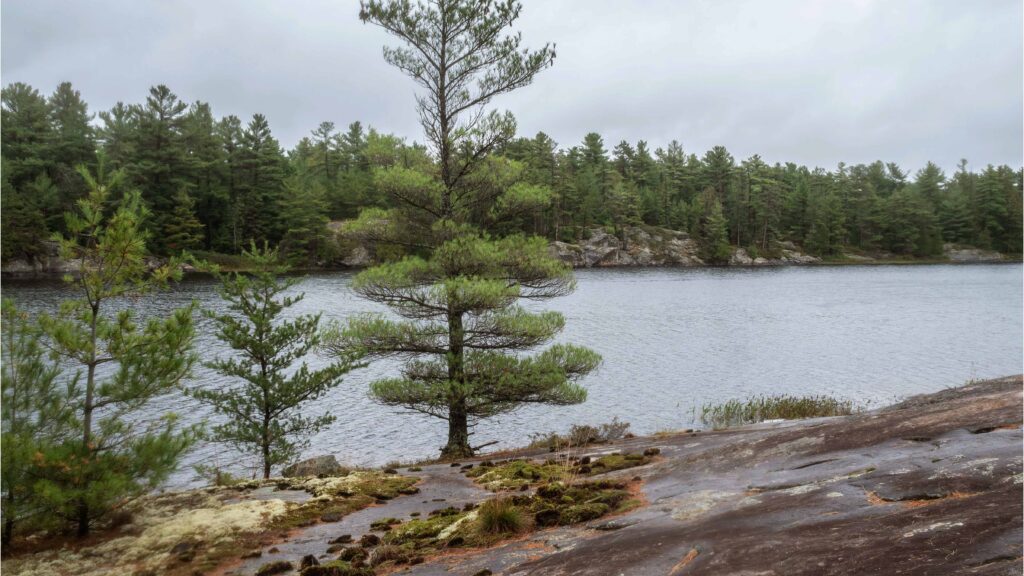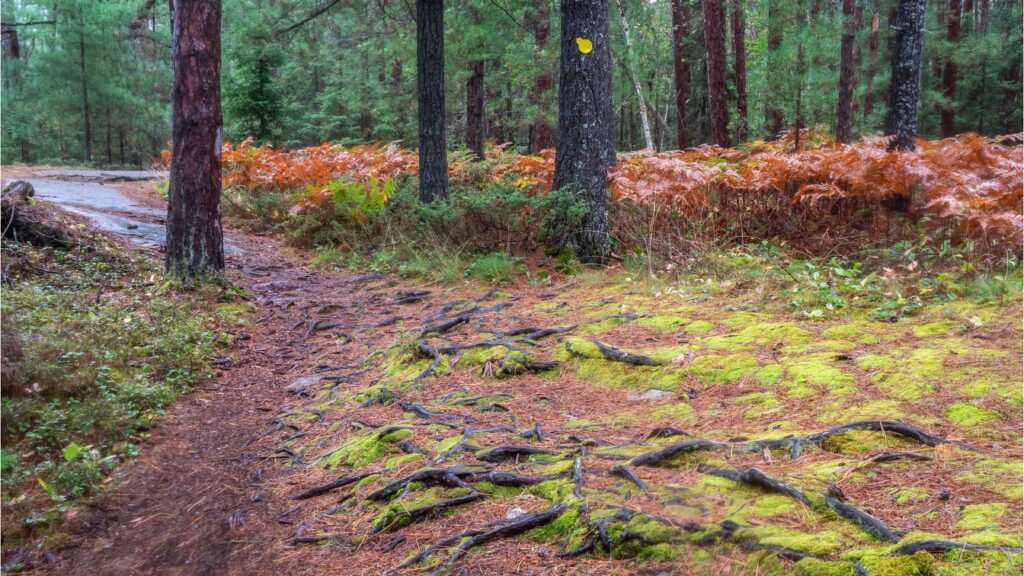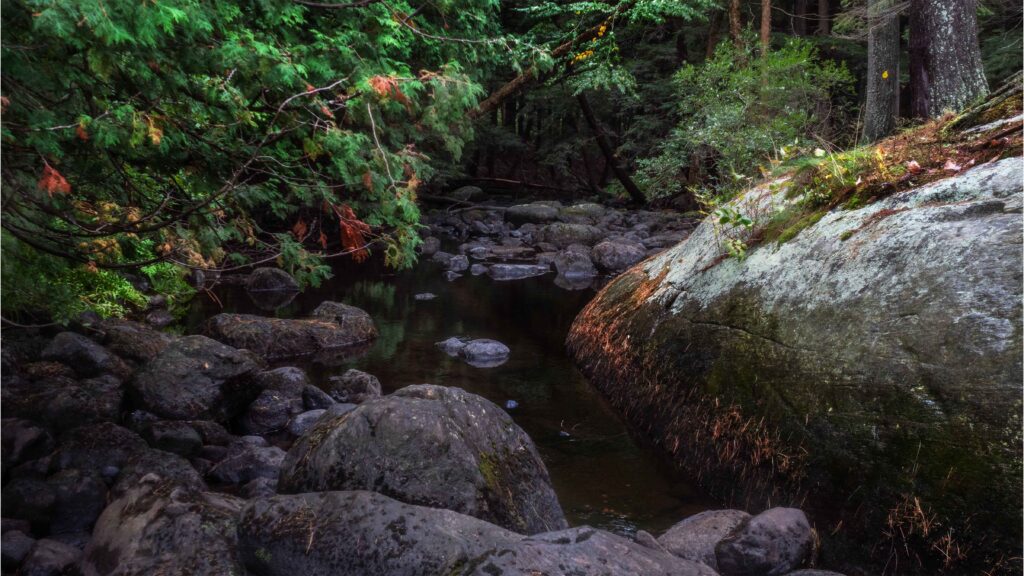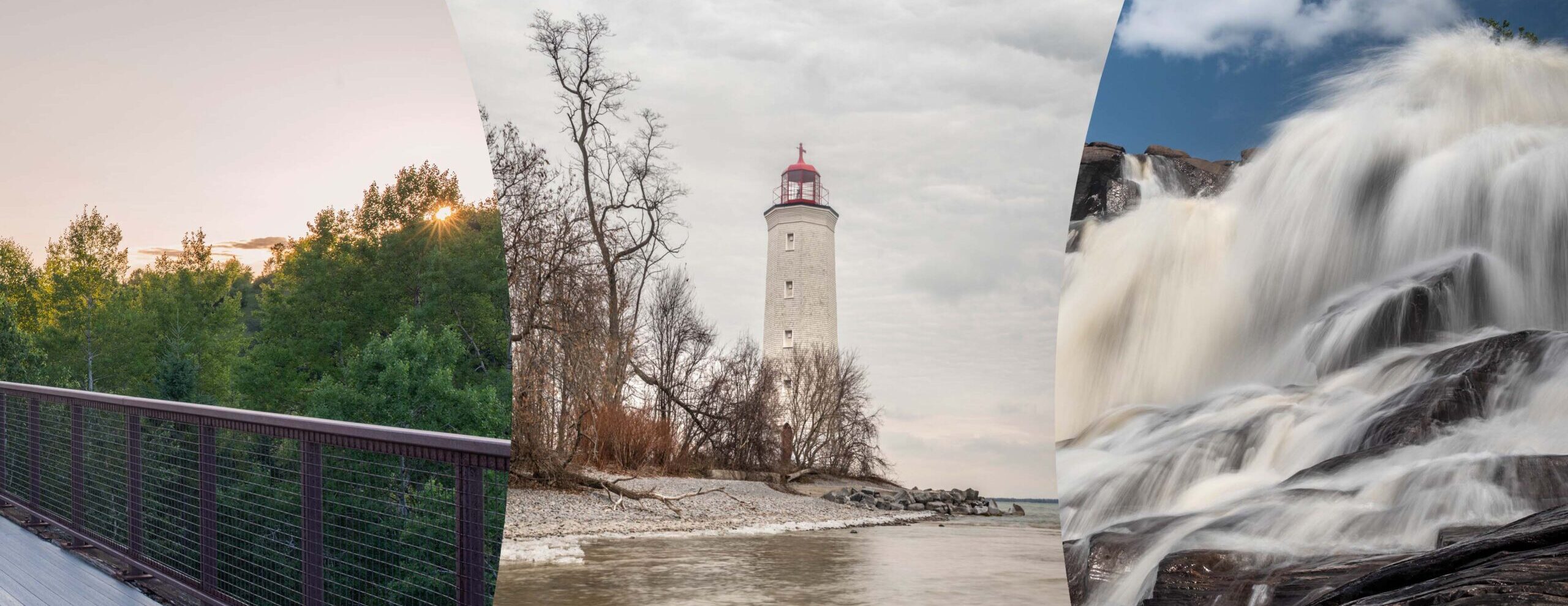Grundy Lake Provincial Park
Tom and Cheryl’s Adventure Camping and Hiking at Grundy Lake
As I adjusted my backpack and glanced at Cheryl, who was eagerly scanning the trail map. The crisp autumn air around Grundy Lake Provincial Park carried the earthy scent of fallen leaves, and the surrounding forest was painted in brilliant hues of orange, red, and gold.
“I think we should start with the Gut Lake Trail,” Cheryl suggested, pointing to a short loop near the edge of the main campground. “It’s not too long, and we can ease into the day.”
I nodded. “Perfect. Let’s see what kind of wildlife we can spot.” The park attendant actually suggested the Gut Trail as her favorite hiking trail in the park.
We had driven up from The Kawartha Lakes for a weekend getaway, eager to escape the day to day grind at home. Grundy Lake Provincial Park , with its serene waters, rugged trails, and abundance of wildlife, on the Canadian Shield had been a favorite spot for years.
As we set off on the trail, the crunch of leaves beneath their boots created a soothing rhythm. The path meandered through a dense forest of maple and birch trees, occasionally opening up to stunning views of Gut Lake.
A loon’s haunting call echoed across the water, adding to the park’s tranquil charm.
“Look at that,” Cheryl whispered, pointing toward a sunlit rock outcrop. A family of painted turtles basked in the warmth, their shells glistening. Nearby, a chipmunk darted across the path, stuffing its cheeks with seeds.
Tom grinned. “This is why I love it here. It’s like stepping into another world.”
After completing the loop, they decided to paddle a canoe on Grundy Lake itself. Renting a canoe from the park office, they launched onto the calm waters, the mirrored surface reflecting the fiery autumn canopy above. Cheryl dipped her paddle into the water, creating ripples that distorted the reflection.
As they glided past rocky shores and small islands, a heron took flight nearby, its massive wings slicing the air. I reached for my camera but decided instead to simply watch the bird’s graceful ascent.
“Sometimes it’s better just to enjoy the moment,”
The afternoon was spent exploring more trails, including the Swan Lake Trail, where they encountered a beaver dam. We marveled at the industrious creatures’ work, noticing fresh gnaw marks on nearby trees.
By evening, we returned to their campsite.
I built a crackling fire while Cheryl prepared our dinner of roasted sausages and vegetables wrapped in foil. As the stars began to dot the darkening sky, we sat side by side, wrapped in a blanket, sipping hot cocoa.
“This was exactly what we needed,” Cheryl said, her voice soft. “No phones, no emails. Just us and this incredible place.”
I nodded, gazing at the heavens. The Milky Way stretched overhead, brighter than they had ever seen it in the city. “We should make this an annual tradition,” I suggested.
Cheryl smiled. “Absolutely.”
As the fire crackled and the forest whispered around them, Tom and Cheryl felt the kind of peace that only comes from being fully immersed in nature. Grundy Lake Provincial Park had once again worked its magic, leaving us with memories to cherish until our next visit.



5 reasons to visit Grundy Lake Provincial Park
Grundy Lake Provincial Park is a destination that truly needs to be visited to be appreciated.
It looks appealing on paper — picturesque lakes, sandy shores, towering pine forests, and numerous excellent camping spots.
However, when you begin to discover the area, those features come alive. This park is greater than just its individual aspects.
Created from volcanic rock and shaped by glaciers, Grundy Lake features stunning landscapes, including wetlands, elevated forests, vast rocky barrens, and multiple shimmering lakes with sandy shores.
These attractions beckon visitors to come and explore!
Here are five essential highlights of Grundy Lake:
1. Discover the shoreline
The banks of Gut Lake offer breathtaking views that display the Precambrian rocks that form the “bedrock” of Grundy Lake.
These rocks originated over one billion years ago deep in the earth’s crust and were sculpted by wind, water, and eventually glaciers, which molded and polished the terrain over 14,000 years ago!
The ideal method to discover this rugged coastline is by hiking the Gut Lake Trail or by paddling on the lake in a canoe or kayak.
During your journey, you can view the rock formations and chatter marks created by glacial ice and melting water.
Chatter marks indicate where rocks trapped in glacial ice ground against the bedrock as the ice gradually advanced southward. The glacial ice eroded the mountains that once towered here (geologists speculate they could have been as tall as the Rockies!), formed over a billion years ago by significant shifts in the Earth’s crust.
Take a moment to envision the earthquakes that shifted immense portions of the Earth’s crust and led to folding!
All this geological activity created faults where water and ice wore away to engineer the park’s lakes — the cliffs along certain areas of Gut Lake are part of this fault system.
In summer, be sure to pause and appreciate the stunning scarlet Cardinal Flowers blooming along the riverbanks at the southern end of Gut Lake.
2. Try sliding down the Slippery Rock
Spend a day enjoying the thrill of sliding down the inclined rock surface into the water at Slippery Rock!
This algae-covered rock serves as a natural slip ‘n slide situated on the right side of Red Maple Beach, making it an ideal location for kids and adults to rediscover their playful side!
Not only does the algae provide entertainment for everyone, but it also serves as a vital food source for invertebrates that are consumed by fish and other aquatic creatures.
Even if you’re an adept swimmer, always swim with a companion! The slippery rock can pose challenges when trying to exit the water easily. Remember, the park offers a PFD Lending Program, allowing you to borrow a life jacket at no cost.
Planning to visit Slippery Rock around dinner time? Take a stroll to the nearby sunset rock at Red Maple Lookout and enjoy watching the sun set over Grundy Lake.
3. Take a trip to Picnic Island
Paddling to Picnic Island on Gurd Lake is a fantastic family day trip.
This delightful little island features majestic old White Pines, clear waters, and beautiful views of the Gurd Lake wetlands and the surrounding lake.
The wildlife flourishes in this wetland area, making it a perfect location to see songbirds, loons, and possibly a turtle or two.
Consider going in the morning to evade the crowds, observe the stunning sunrise over Gurd Lake, or hear the haunting calls of loons echoing across the water.
Best of all, it’s only a short distance from Poplar, Trailer, and Hemlock beaches, making it an ideal outing for novice paddlers.
4. Paddle through the wetland to Bucke Lake
Grundy Lake is rich in diverse, vibrant habitats.
Other creatures thrive in these settings! Beaver ponds and wetlands are vibrant centers of biodiversity, with numerous plants and animals residing there. The next time you spot a diligent beaver, make sure to express your gratitude for the wealth of life it contributes to the environment.
Starting at the main beach, paddle to the upper end of Grundy Lake and navigate through the wetland.
Trace the creek as it winds through the sedge and grass-covered beaver meadow, before opening up into the picnic area at the conclusion of the Beaver Dam Trail.
Pause for a snack on the rocky outcrop shaped by glaciers before proceeding with your paddle up to Bucke Lake.
This route presents some challenges! Beaver activity is prevalent along this path, so be prepared to navigate around two or three beaver dams that you will need to lift over.
Beavers are extraordinary builders of habitats! They construct dams to regulate water levels, creating a safe haven from predators for their homes, known as lodges, and allowing them easy access to nearby trees (the small branches serve as their food).
5. Portage a canoe or kayak from Gurd Lake to Pakeshkag Lake
Enjoy tranquility on the inland waters of Grundy Lake without the need for backcountry camping!
Challenge your portaging abilities by completing a series of two simple and one moderate portages that connect Gurd Lake, Beaver Lake, Pakeshkag River, and northern Pakeshkag Lake.
A brief lift over the bedrock is part of the Pakeshkag portaging route.
These portages were established thousands of years ago by Indigenous travelers and were later utilized by the voyageurs in the Canadian fur trade, linking them to an extensive network of routes across North America.
Once you arrive at Pakeshkag Lake, take a moment to reflect on your journey. Appreciate the scenery of pine trees and carved bedrock and consider how glaciation and history have shaped this landscape.
